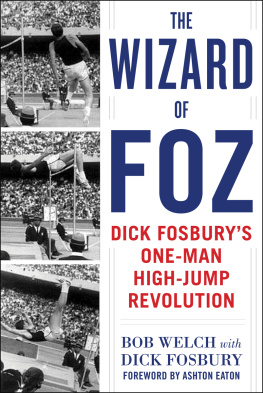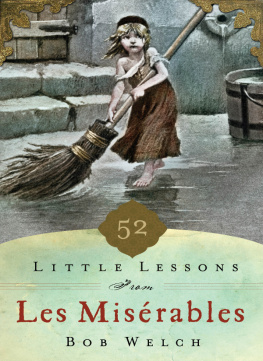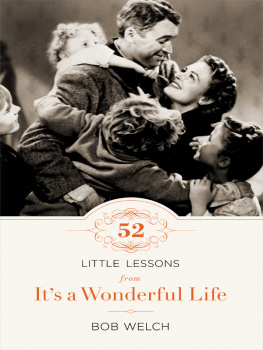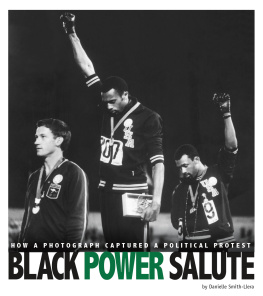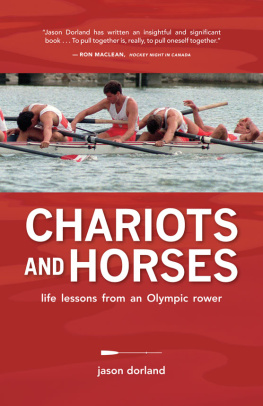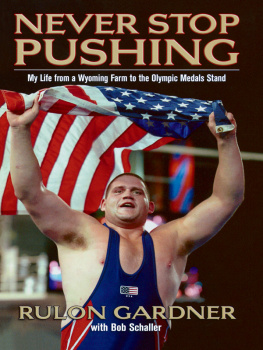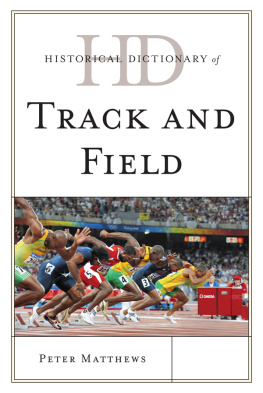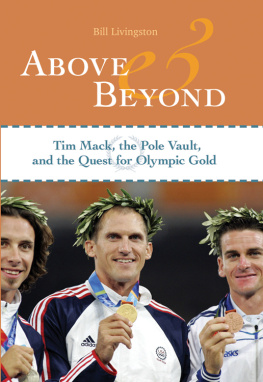Praise for The Wizard of Foz
Welch begins his chapters with the greatest collection of stirring epigrams Ive ever found in a single work. That means it is a history filled with the suffering of pursuing a new idea in a world fanatically ready to doubt. It is about the power of invention, and the need for wisdom in teachers confronted by that invention. Fosbury and our society have needed decades to be able to fully tell or accept Dicks story. Now it is done, and Welch does magnificent justice to it all.
Kenny Moore, Olympic marathoner, former Sports Illustrated writer, and author of Bowerman and the Men of Oregon
Competing in the Olympic trials is stressful and nerve-racking enough, but to have to do it twice? Dicks read gives us a peek into an athletes world and more importantly the politics that have seeped their way into the sport!
Debbie Meyer, three-time Olympic champion and Sullivan Award winner
Great read! Bob Welch has the rare ability to provide context to what some might consider to be purely a sports story. He evokes a time and place that many of us remember well, and provides insight for those who came after. This is a history book in the best sense of that phrase.
Tom Jordan, author of Pre: The Story of Americas Greatest Running Legend, Steve Prefontaine
Dick Fosbury has always been one of the most compelling figures in American sports. Through Bob Welchs fascinating look at Fosburys extraordinary story, we see just how the high jumps innovative but enduring style was created. Fozs ingenuity combined with Welchs purposeful prose results in one great book. Its anything but a flop.
Kerry Eggers, sports columnist, Portland Tribune
The Wizard of Foz raises the bar in showcasing the life of a man who revolutionized the high jump. Whether youre a track enthusiast or not, its a must read.
Tom Pappas, former world decathlon champion
Newly employed at Track & Field News in the late 1960s, I imagined knowing much about Dick Fosbury. Lately Ive learned that I knew little beyond his Flop and resulting statistics. Bob Welchs book teaches in wonderful detail about the man behind the method.
Joe Henderson, former writer/editor for Track & Field News and Runners World
In a moment of mid-air inspiration, a mediocre prep high jumper named Dick Fosbury changed the course of his event, and his life. Such is the impact of the Fosbury Flop that the label itself seems virtually forgottenits simply the way all high jumpers compete these days. In The Wizard of Foz author Bob Welch excellently captures the angst of the teen-age high jumper who became an Olympic gold medalist during the turbulent late 1960s. Its the rest of the story you never knew.
Ron Bellamy, former (Eugene) Register-Guard sports editor and winner of the Track and Field Writers of Americas Jesse Abramson Award for Excellence
As an author of sports books, Im no stranger to athletes-overcoming-the-odds stories. But Welchs Fosbury tale is like nothing Ive ever seen. Though flat-out true, it has the feel of fantasy, particularly when Dick is struggling to make the Olympic team at a high-mountain venue where giant pines stretch to the sky from within the tracks infield. But such fantasy clashes with the volatile 60s. Ultimately, Fosbury not only changes the world, but the world changes him, particularly in his seeing the light regarding the insidious racism so many wanted to ignore.
Mike Yorkey, coauthor of After the Cheering Stops: An NFL Wifes Story of Concussions, Loss, and the Faith That Saw Her Through
The Wizard of Foz is more than a sports story. Its a wonderful narrative about the culture of innovation, rooted in the pioneer spirit of Oregon.
Paul Swangard, TV track and field commentator and Olympic Games in-stadium announcer
Masterfully written with exactness of countless memories. This book from the beginning is a testament of family love through the pain of family tragedy. The social growth wrapped around the mental anguish of Dicks options through a time of social change did not interrupt his battle to defeat the many competitive negatives received on his journey to capture elusiveness.
Tommie Smith, 200m gold medalist, Mexico City 1968 Olympics
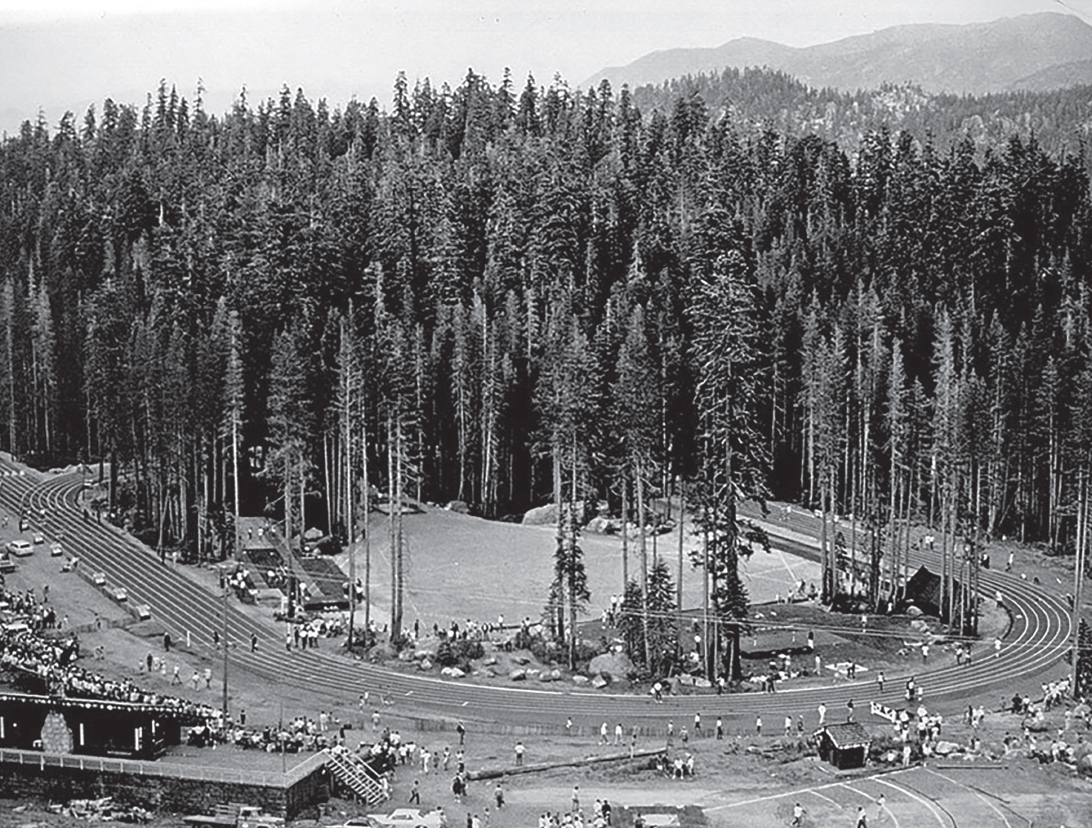
THE ECHO SUMMIT TRACK AND FIELD LAYOUT, WHERE FOSBURYS CHANCES OF MAKING THE OLYMPIC TEAM CAME DOWN TO A SINGLE JUMP DURING THE TRIALS, HAD A FANTASY FEEL TO IT. HIGH-JUMP PIT WAS JUST INSIDE THE TRACK, LOWER RIGHT.
(STEVE MURDOCK/CITY OF SOUTH LAKE TAHOE)
Copyright 2018 by Bob Welch and Dick Fosbury
All rights reserved. No part of this book may be reproduced in any manner without the express written consent of the publisher, except in the case of brief excerpts in critical reviews or articles. All inquiries should be addressed to Skyhorse Publishing, 307 West 36th Street, 11th Floor, New York, NY 10018.
Skyhorse Publishing books may be purchased in bulk at special discounts for sales promotion, corporate gifts, fund-raising, or educational purposes. Special editions can also be created to specifications. For details, contact the Special Sales Department, Skyhorse Publishing, 307 West 36th Street, 11th Floor, New York, NY 10018 or .
Skyhorse and Skyhorse Publishing are registered trademarks of Skyhorse Publishing, Inc., a Delaware corporation.
Visit our website at www.skyhorsepublishing.com.
10 9 8 7 6 5 4 3 2 1
Library of Congress Cataloging-in-Publication Data is available on file.
Cover design by Tom Lau
Cover photo credit AP Images
ISBN: 978-1-5107-3619-1
Ebook ISBN 978-1-5107-3625-2
Printed in the United States of America
To those who follow their imaginations,
shoot for the moon,
and stand for whats right.
Those who have finished by making all others think with them have usually been those who began by daring to think for themselves.
C. C. Colton
CONTENTS
FOREWORD
FOSBURY! REMEMBER FOSBURY! I was at the 2011 IAAF World Track and Field Championships in Daegu, South Korea, and, from beyond the high jump pit, my coach Harry Marra was saying these words to me because I was in trouble. A year before I had graduated from the University of Oregon, signed a shoe deal, and become a professional decathlete. Now I was a young athlete in my first global competition as a professional. And ranked No. 1 in the world.
I had recently amassed the highest decathlon score in the world by a decent margin. It was the year before the Olympic Gamesa critical time for an athlete like me hoping to make the U.S. Olympic team. The competition in South Korea was an important proving ground on many levels. And, frankly, I was not doing well. It was my last attempt in the high jump; the bar was not high.
Fosbury! Remember Fosbury! It seems almost cosmically designed that Marra was yelling that at me at this pivotal point in my career. Dick and I were both born in Portland, both raised in Oregon, and both graduates from colleges in the Willamette Valley. As I stared at this seemingly insurmountable height, the only difference between us was that Dick was an Olympic champion and I was only hoping to become one.
So it seemed ironic that I was struggling with the event in which he had won gold. A few weeks prior to this meet I started looking at videos of the top high jumpers in the world, trying to see if there was something I could do to improve. After hours of analyzing the top men and women, I was still struggling to understand the keys to the technique. Then it dawned on me: these athletes didnt invent this technique. They were emulating the Flop style just like I was.
Next page
